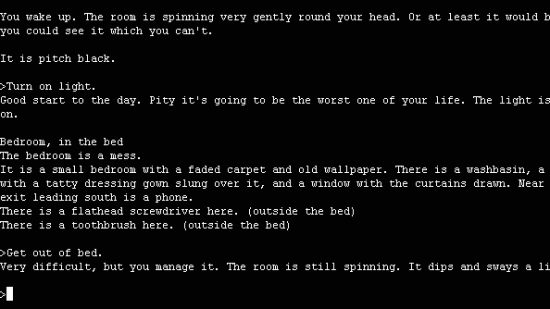TaleSpinner is “a publisher and development system for original works of interactive fiction,” or what many of us might call text-based adventure games (though, yes, I’m aware the categorisation is a bit more complex than this). It’s something that its creators say will help Interactive Fiction writers to both create and publish their work, as well as earn royalties from it. In the latter case, those royalties will be split between them and the creators of TaleSpinner, a team that include Chris Taylor, the CEO of Gas Powered Games.
After a year in development, the TaleSpinner team have now decided
it is time to begin crowdfunding their work and have turned to IndieGoGo, where they’ll be collecting funds until April 24. They hope to raise $36,500 Canadian.
Taylor is joined by Pete Gardner, who has been working on interactive fiction titles since the early 1980s, and project manager Allan Nienhuis. Their goal is to create something more than just a development tool for interactive fiction, but instead a process more akin to a development cycle, which includes submission, approval, QA and testing, the chance for creators them to add graphics and sound effects to their work, publishing and, finally, promotion. It looks like TaleSpinner is going to separate the works submitted into chapters, to “entice sales by offering the finished title in three parts,” the first offered for free.
The concept sounds to me rather like Steam for interactive fiction, as it’s providing both a delivery mechanism and an approval process. While I can see what the appeal would be to writers of interactive fiction, as well as those who would run it and profit from it, it’s surely a harder sell to the average user. You’re not funding the creation of any interactive fiction itself, you’re instead paying money towards helping other people create a platform through which they will be able to offer other people’s work in the future. It’s an interesting idea and could work well, but I’m not sure it’ll capture the popular imagination enough to inspire crowdfunding. Then again, who knows?
